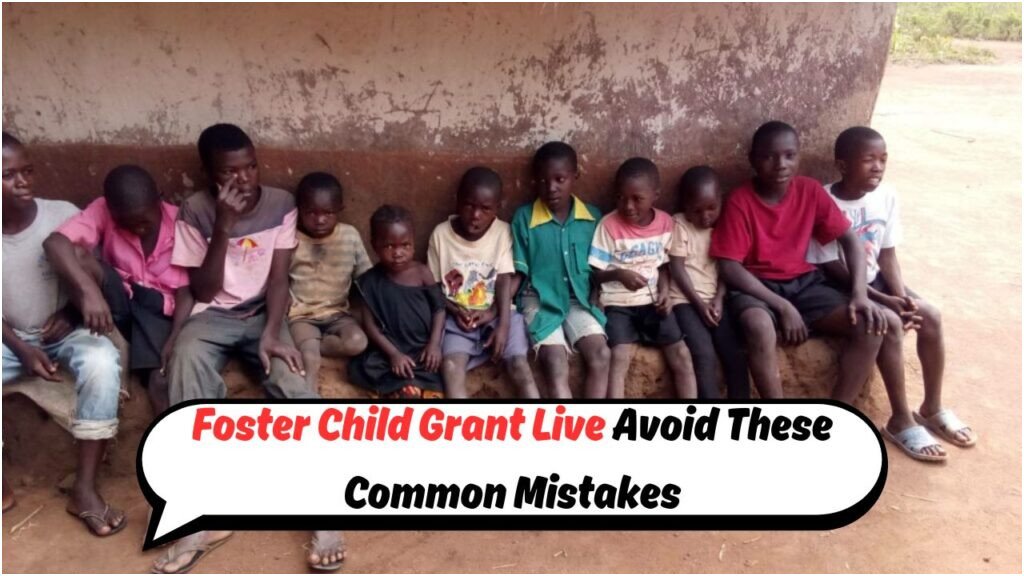Unlock R1,250 Foster Child Grant for August 2025: Understanding how to navigate the application process for the foster child grant in South Africa is crucial to ensure you receive the R1,250 allocated for August 2025. This financial assistance can make a significant difference in the lives of foster children, providing them with better opportunities and access to essential services. However, many guardians encounter common pitfalls that can delay or even prevent the approval of their grant applications. By being informed about the potential obstacles and how to avoid them, you can streamline the process and ensure timely support for your foster child.
Understanding the Foster Child Grant Eligibility Criteria
Securing the foster child grant requires meeting specific eligibility criteria set by the South African government. These criteria are designed to ensure that the grant reaches those who genuinely need it. Firstly, the child must be legally placed in foster care by a court order, which serves as proof of the foster arrangement. Additionally, both the child and the foster parent must be residents of South Africa. It’s essential for the foster parent to provide a stable environment and be capable of managing the child’s welfare. Understanding these requirements thoroughly can prevent unnecessary delays in the application process.
- Legal foster care placement documentation
- Proof of residency for both child and guardian
- Capability to provide a stable environment
- Regular updates on the child’s welfare
- Compliance with court orders
Common Pitfalls in the Grant Application Process
One of the most common reasons for grant application delays is incomplete documentation. Ensuring that all required documents, such as identification, proof of residence, and court orders, are submitted correctly is crucial. Another frequent issue is not updating the Social Security Agency on changes in the child’s circumstances, such as moving to a new residence or changes in schooling. Failure to report these changes can lead to suspension of the grant. Additionally, meeting deadlines for submission of documents and responses is vital to avoid interruptions in grant payments.
| Common Pitfall | Solution |
|---|---|
| Incomplete documentation | Double-check all paperwork before submission |
| Failure to report changes | Inform SASSA promptly about any changes |
| Missing deadlines | Keep track of important dates and set reminders |
Maximizing the Benefits of the Foster Child Grant
Once approved, the foster child grant provides essential support that can be maximized to benefit the child. It’s important to allocate the funds towards educational supplies, healthcare, and basic needs such as clothing and food. Additionally, engaging the child in extracurricular activities can foster personal development and provide a well-rounded upbringing. Foster parents should also consider setting aside a portion of the grant for unforeseen expenses, ensuring financial readiness for emergencies.
- Prioritize educational expenses
- Ensure access to healthcare
- Allocate funds for extracurricular activities
- Maintain a savings plan for emergencies
Documenting and Reporting Grant Usage
Documenting the usage of the foster child grant is not only a requirement but a best practice for accountability and transparency. Keeping detailed records of expenditures helps foster parents manage the funds effectively and allows them to provide accurate reports to the authorities if required. Regular reporting demonstrates responsible management of the grant, which can influence future grant approvals. Foster parents should maintain receipts and logs of all expenses related to the child’s welfare.
| Expense Type | Documentation Required |
|---|---|
| Educational Supplies | Receipts and invoices |
| Healthcare | Medical bills and prescriptions |
| Clothing and Food | Purchase receipts |
| Extracurricular Activities | Enrollment and participation records |
Addressing Challenges in Foster Care
Foster parents in South Africa often face unique challenges that go beyond financial support. Emotional and psychological support for both the child and the guardian is crucial. Access to counseling services and support groups can be beneficial in addressing these challenges. Fostering a sense of belonging and stability is essential for the child’s development and well-being, and foster parents are encouraged to seek community resources and government programs designed to support foster families.
- Seek counseling services
- Join support groups
- Utilize community resources
- Engage in family activities
Future Prospects and Changes in Grant Policies
The South African government periodically reviews social grant policies, including the foster child grant, to ensure they meet the current needs of society. Future changes may include adjustments to the grant amount or modifications in eligibility criteria. Staying informed about these potential changes is crucial for foster parents to plan accordingly. Engaging with policy updates through official government channels and community meetings can provide insights into upcoming changes and how they might affect foster care arrangements.
| Policy Change | Impact |
|---|---|
| Increase in grant amount | Additional financial support |
| Stricter eligibility criteria | More rigorous application process |
FAQ: Common Questions about the Foster Child Grant
How can I apply for the foster child grant in South Africa?
Applications can be made at your nearest SASSA office with the required documentation, including identification, proof of residence, and court orders.
What happens if my application is denied?
If denied, you can appeal the decision by submitting additional documentation or clarifying any discrepancies with SASSA.
Can the grant amount be increased?
The grant amount is subject to government policy and budget allocations, which may change periodically.
Are there any tax implications for receiving the grant?
The foster child grant is not taxable income, and it does not affect your tax liabilities.
How can I ensure continuous receipt of the grant?
Maintain compliance with all reporting requirements and promptly notify SASSA of any changes in circumstances.





